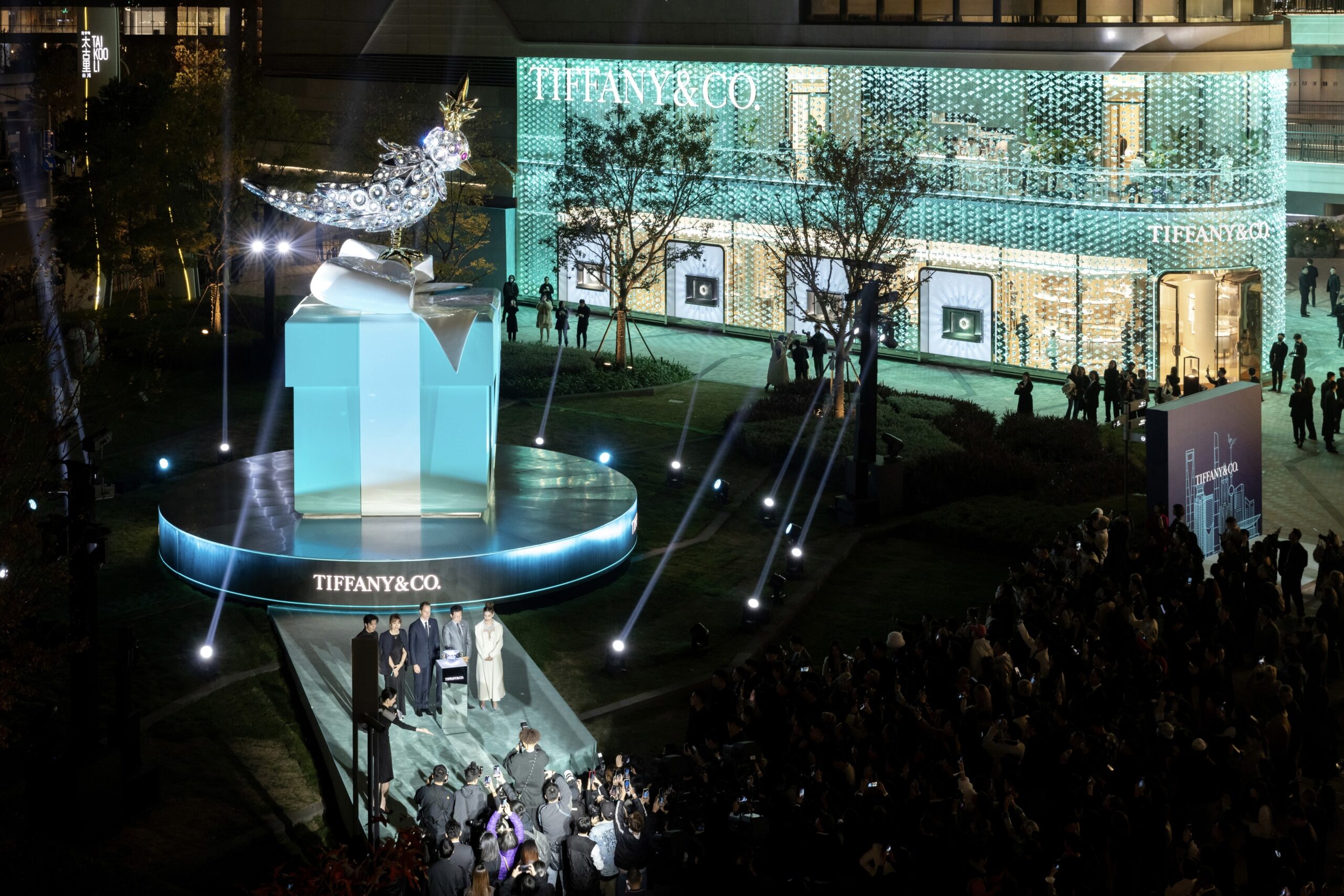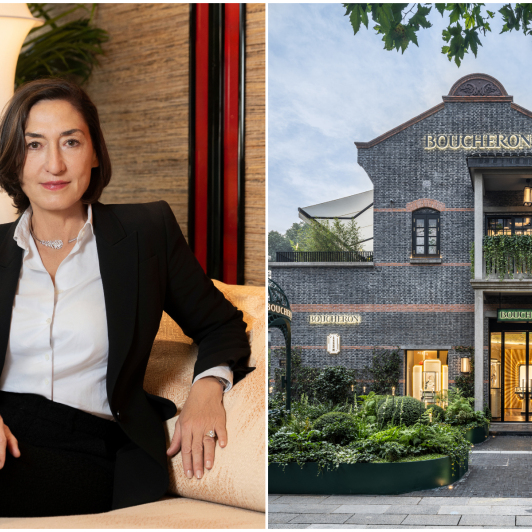
Following the intense competition in the Chinese duty-free market, there is significant potential emerging for the transformation and upgrade of the duty-paid market.
On September 3rd, the DFS boutique store at Chongqing Jiangbei International Airport was officially inaugurated.
As a luxury travel retail subsidiary under the LVMH Group, this is one of the largest airport duty-paid retail spaces the company has established in mainland China.
At the opening ceremony, Luxe.CO had a special interview with Nancy Liu, the President of DFS China. She told us:
“Chongqing Jiangbei International Airport has 50-60% of its passengers as business travelers, with some of them passing through here 4-5 times a year. They are a high-quality and mature customer group, and they are also consumers of luxury brands. Since they don’t have time to shop in the city center regularly, their purchasing decisions at the airport shops are very decisive and quick.” It is reported that on the opening day of the Bvlgari DFS store, the first transaction was completed within just one hour, and the transaction amount was quite impressive.
In this conversation, Liu shared with us DFS’s thoughts and strategies for the duty-paid retail business, such as:
- Why did DFS choose to enter the mainland duty-paid retail market starting from Chongqing Jiangbei Airport?
- How does DFS think and plan its domestic duty-paid retail business?
- How can the service and image of brand airport stores be upgraded?
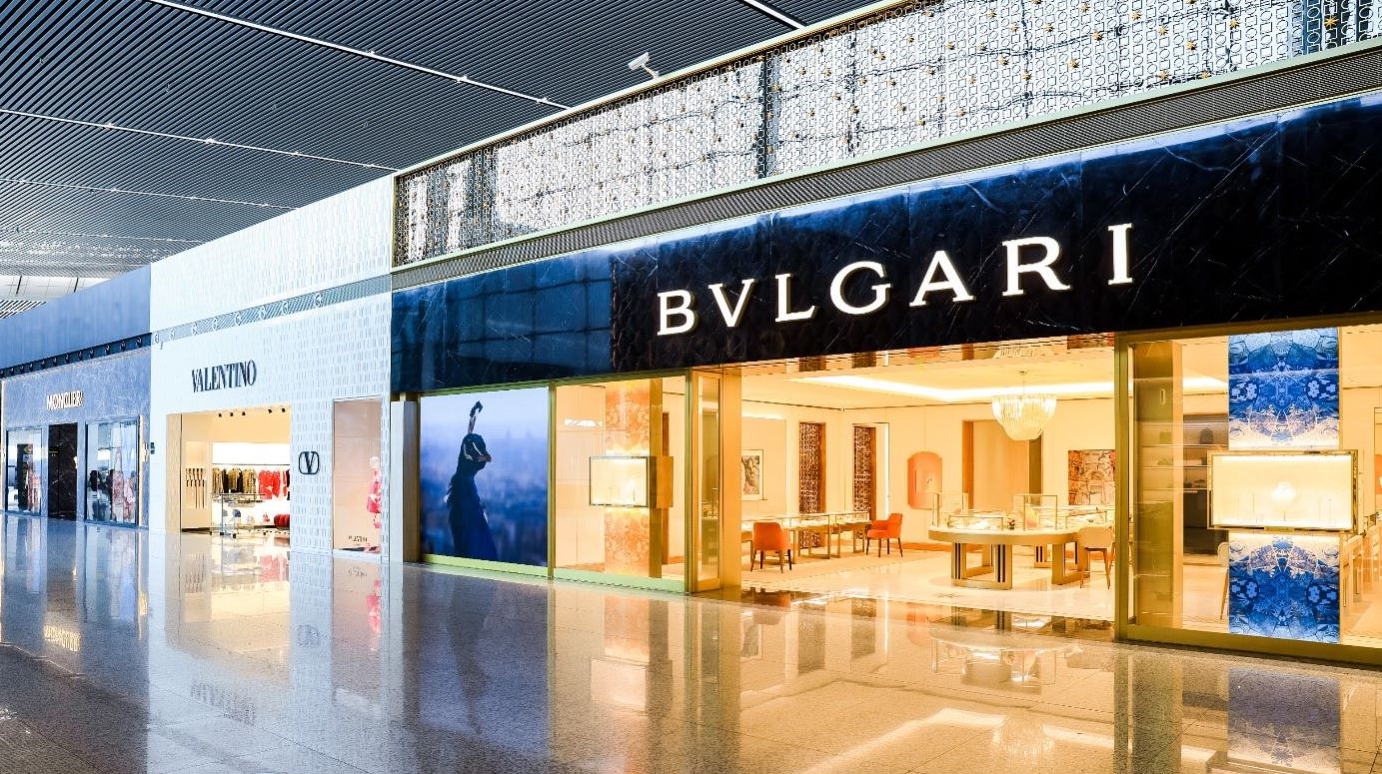
DFS China President: “Expanding Duty-Paid Retail Business is a Must!”
“China has one of the highest numbers of airports globally, and in the future, there will be 1.5 billion air travelers. This is an astronomical figure, and no other market has such numbers!” Liu stated that expanding the duty-paid retail business in China is a “must” for DFS!
When discussing the current opportunity for vigorously expanding airport duty-paid business, Nancy Liu, the President of DFS China, cited several sets of data:
- According to the National Civil Aviation Work Conference, by 2022, there will be a total of 254 transportation airports in China.
- According to the 14th Five-Year Plan for Civil Aviation Development, it is expected that by 2025, there will be over 270 civil transportation airports.
- As reported by National News Broadcast, by 2030, 1.5 billion ordinary Chinese citizens will have the opportunity to travel by plane.
Founded in 1960 in Hong Kong, DFS introduced the concept of travel retail, and its retail network of 54 duty-free shops spans across four continents worldwide. Currently, the majority of DFS’s shares are owned by the world’s largest luxury goods conglomerate, LVMH Group.
In July 2022, DFS obtained the concession rights for the domestic boutique section of Chongqing Jiangbei International Airport’s T3A terminal, taking the first step in expanding its duty-paid business in mainland China.
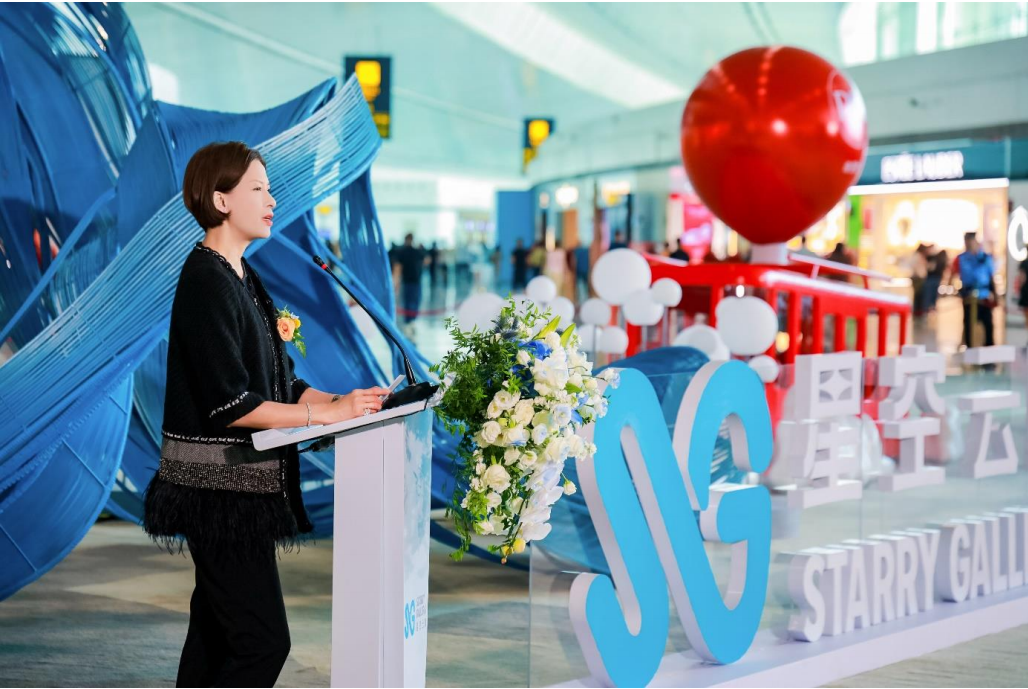
This time, DFS has opened a series of new boutiques in the T3A terminal of the airport, with a design and operational area exceeding 2,000 square meters.
Here, you can find a gathering of 16 luxury boutiques, including Bvlgari, Valentino, Moncler, Qeelin, Montblanc, Zegna, Emporio Armani, Bally, Versace, Max Mara, Polo Ralph Lauren, Chloe, Coach, Tory Burch, Kering Eyewears, and Sunglasses – Generic.
By the end of the year, DFS will continue to introduce brands like Longchamp, Jimmy Choo, Tissot, and more.
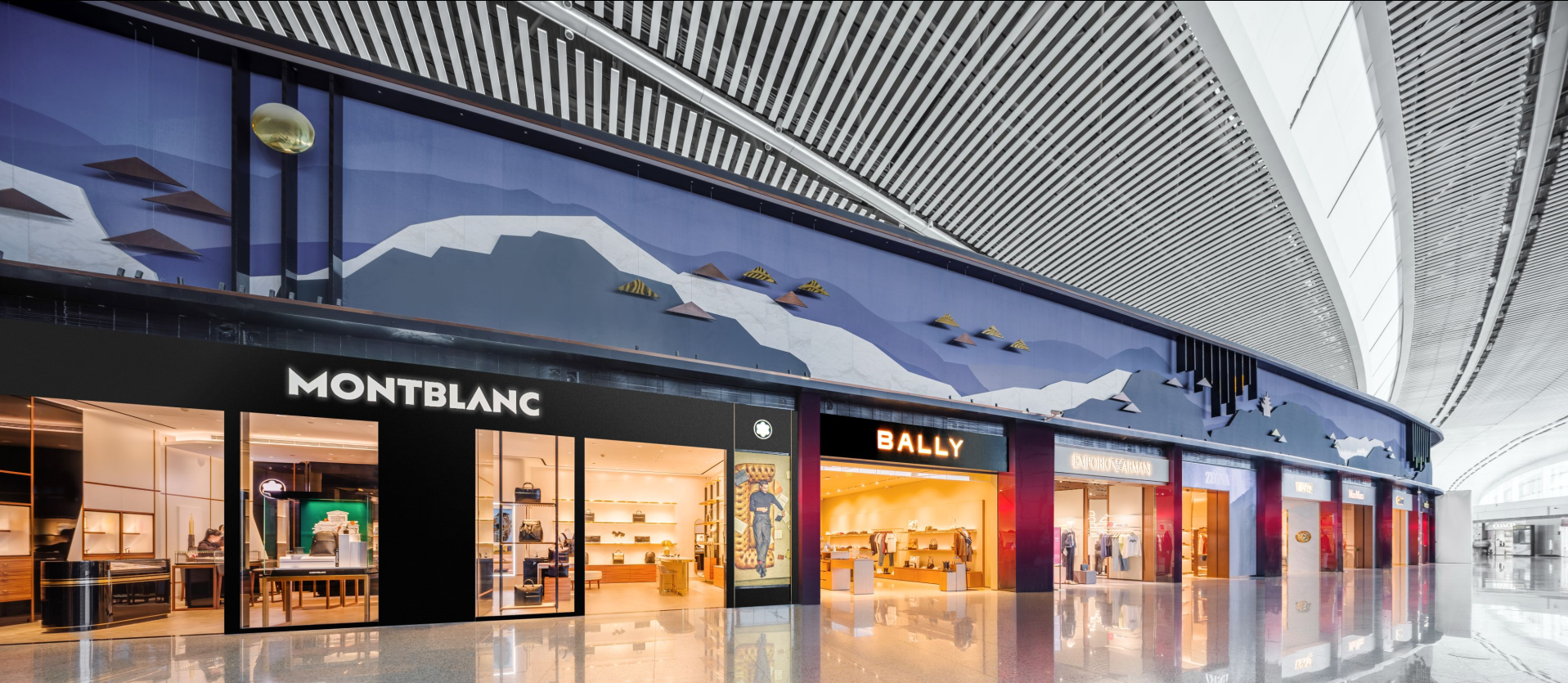
Why Take the First Step in Expanding Duty-Paid Business in Chongqing Jiangbei Airport?
Chongqing, with a resident population of 321.34 million, ranks first in the country (2022 statistical data).
Chongqing’s GDP reached 2.91 trillion yuan, ranking among the top four nationally, only behind Shanghai, Beijing, and Shenzhen.
According to data disclosed by Chongqing Jiangbei International Airport: In July of this year (summer travel season), the airport welcomed and sent off 4.277 million passengers, with the highest daily passenger volume reaching 152,200, setting a historical record. On the first day of the May Day holiday, the airport handled a cumulative total of 144,000 passengers, surpassing the peak of the Spring Festival, mainly from first-tier and new first-tier cities such as Shanghai, Hangzhou, Nanjing, Guangzhou, Shenzhen, and Xiamen.

This vibrant mountainous city is not only a beloved tourist destination for countless Chinese but also an important destination for business travel. In 2021, the National Comprehensive Multimodal Transport Network Plan designated Chongqing as one of the international comprehensive transport hub cities.
In the first half of this year, Chongqing Jiangbei International Airport ranked second in passenger throughput nationwide.
Chongqing Jiangbei International Airport’s slogan is “The closest place for Sichuan and Chongqing residents to leave home.” “Starting from the airport, it covers a population of 100 million within a 3-hour radius, creating a hub airport for Sichuan and Chongqing residents.”
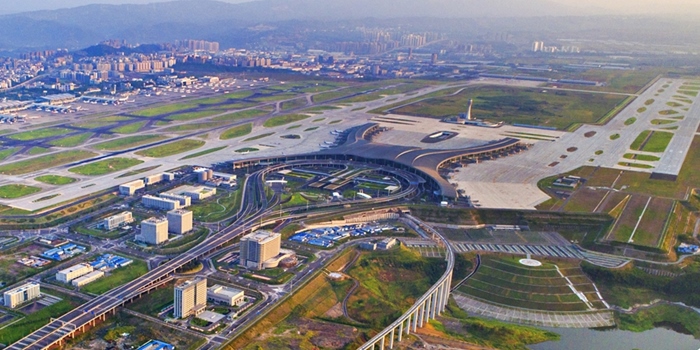
Simultaneously with the unveiling of DFS’s boutique store at Chongqing Jiangbei International Airport, the T3A terminal of Chongqing Jiangbei International Airport introduced a brand new commercial complex brand, Starry Galleria.
This means that the T3A terminal of Chongqing Jiangbei International Airport has become the first domestic airport to operate the airport waiting hall with a shopping center concept.
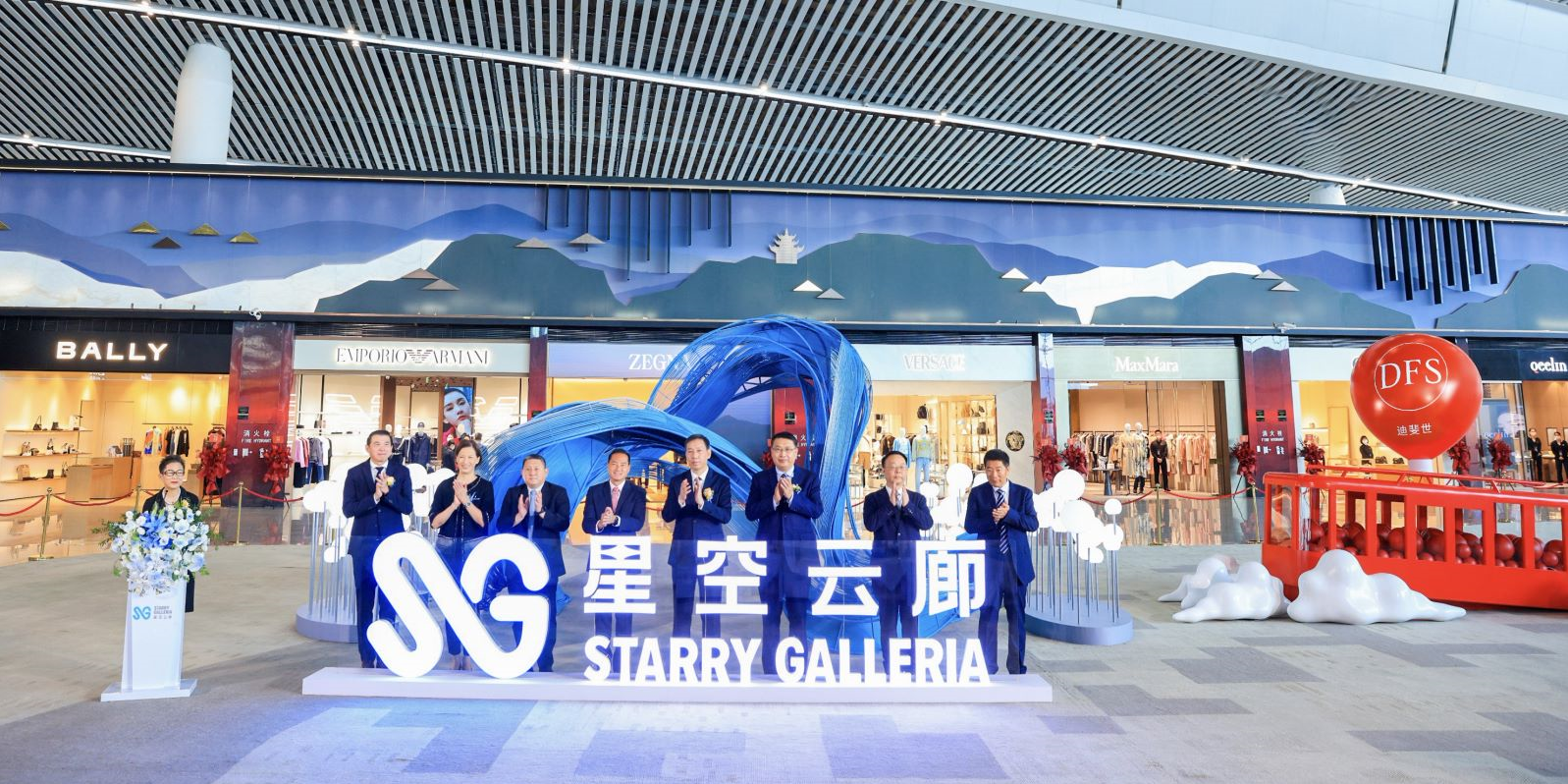
The management and operation company of Chongqing Jiangbei International Airport, Chongqing New Airport Commercial Management Co., Ltd., is jointly invested by Chongqing Airport Group Co., Ltd. and Changi Airport (China) Pte. Ltd.
With the new round of airport business format upgrades, Chongqing Jiangbei International Airport intends to benchmark Singapore Changi Airport.
“Take Changi Airport as an example. Many people are willing to go to Changi Airport two to three hours in advance. The indoor waterfalls and green environment at the airport make everyone feel it’s worth going early, and there are many places to check in,” Liu said. “We hope that in terms of overall business operations, we can achieve the level that Changi Airport has reached in the airport field.”
As China’s physical retail continues to evolve, consumers have higher demands for spatial design, brand matrices, and service experiences in commercial spaces. In comparison, the duty-paid retail business at airports, specifically referring to the waiting areas for domestic flights, appears relatively outdated and urgently needs an upgrade.
For every brand, achieving a full-channel and standardized brand construction is a permanent challenge.
After the pandemic, the significant importance of investing in offline channels for brands has become evident. According to Luxe.CO’s observations, many fashion and luxury brands have increased their investments in flagship stores in top commercial centers, duty-free business layouts, and offline collaborations with high-end hotels. However, the immense potential of airport channels, constantly filled with business travelers and tourists, has yet to be fully tapped.
What Confidence and Advantages Does DFS Have in Expanding Duty-Paid Business?
- More Top-tier and Abundant Brand Resources
- Helping Brands Efficiently Expand into Airport Channels
- Enhancing the Service and Image of Brand Airport Stores
- Ensuring Consumers Shop with Confidence and Comfort
Nancy Liu stated that many brands have inquired about how to cooperate with DFS to enter airport channels, saying, “We believe that DFS has a great opportunity to help more brands quickly enter airport channels.”
When asked about DFS’s role in airport duty-paid business, Liu replied, “We are a trusted partner for airports, brands, and consumers.”
As a part of the world’s largest luxury goods conglomerate, LVMH Group, with over 60 years of experience in luxury travel retail, DFS Dufry maintains close partnerships with numerous top international brands and possesses abundant brand resources.
In China, DFS has already opened 8 stores in Macau and has created the “first store effect” for DFS, leading a new trend in global travel retail. DFS has established various first-of-its-kind spaces in Macau, including the first multi-jewelry concept store, the first shoe section, the first independent beauty concept store, the first children’s area, the first diversified parent-child family area, and the first in-store live broadcasting studio, among others.
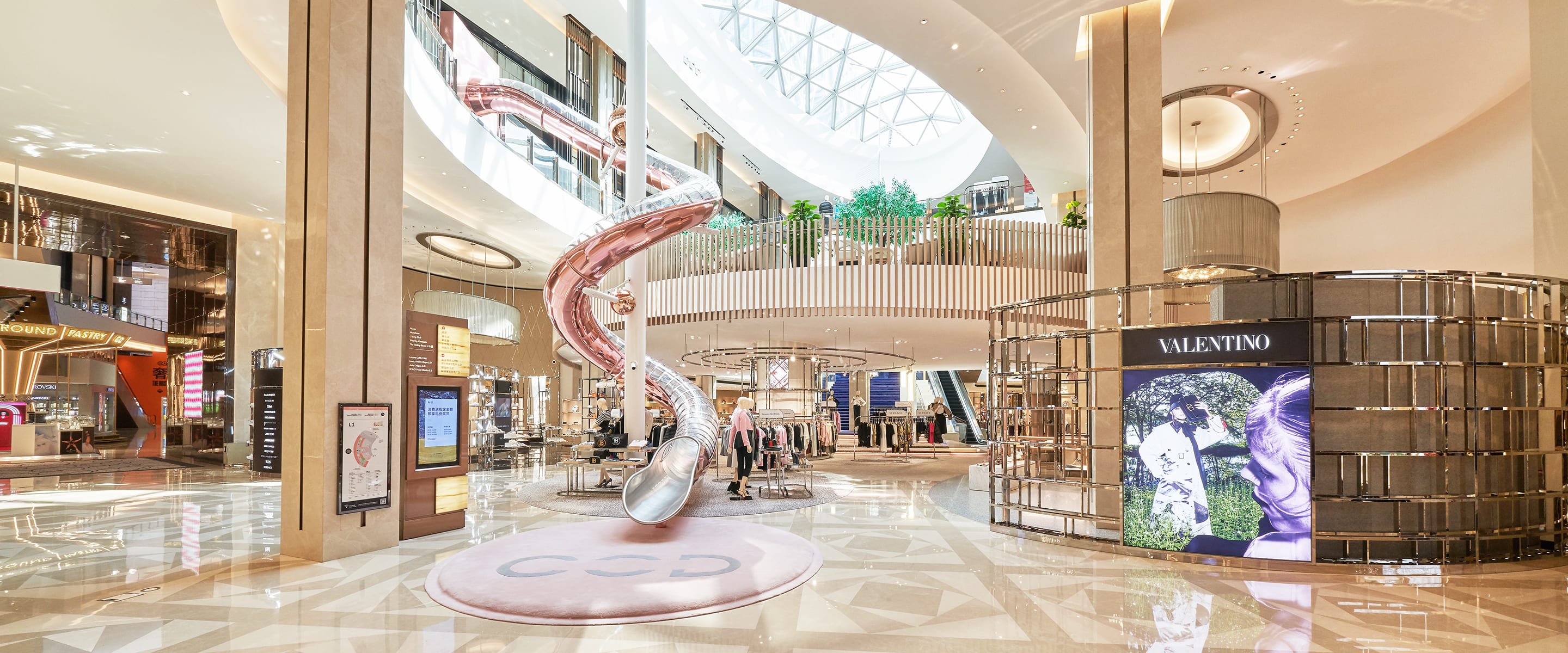
DFS’s T Galleria store at New Yaohan in Macau (excluding duty-free stores, DFS’s T Galleria has 23 city center stores worldwide).
In September 2021, Liu joined DFS as the President of DFS China. Prior to that, she served as the CEO of the diamond jewelry brand De Beers Forevermark.
With rich experience in the consumer goods and luxury retail industry, she understands that for luxury brands, maintaining consistent service is crucial in any retail channel.
“In the past, the service at airport stores was detached from the brand. Although airport stores are not operated by the brand, if consumers have a bad experience at the airport store, they will think that the brand’s service is poor,” Liu said.
For brands, the upgrade of airport channels is an excellent opportunity to expose themselves to a high-quality business traveler audience, making high-level brand service and consistent brand image even more critical.
However, due to the complex procedures for airport connections, the complexity of airport store operations, and the differences in operating models compared to stores in city centers, only a few brands have the capability and resources to directly open their own stores at airports.
Currently, apart from luxury brands operated by DFS, Gucci, Cartier, and Burberry within the enclosure are luxury brands with direct operations at Chongqing Jiangbei International Airport’s T3A terminal.
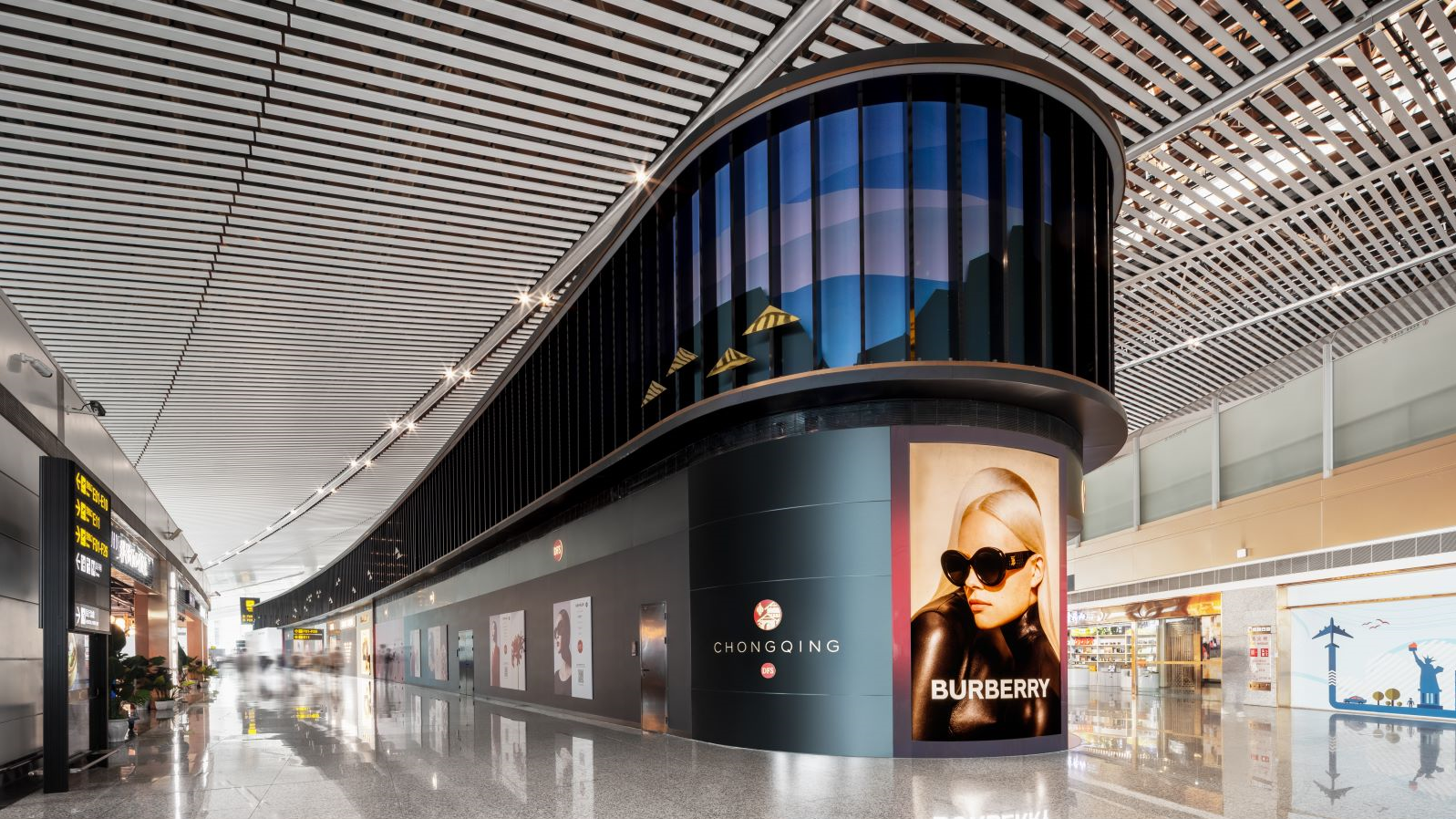
Therefore, DFS relies on its rich luxury retail experience to help brands provide the same brand service at airport stores as they do at their flagship stores, ensuring that consumers have a seamless brand experience at airport stores.
In Chongqing, DFS has introduced a global service guarantee, including a “90-day no-questions-asked return and exchange service, 30-minute resolution of customer inquiries and complaints, and providing solutions to customers within 2 days.”
Liu gave an example: Consumers have a strong demand for gift shopping during their travels, but it is often challenging to determine the size of the products. DFS China stores accept returns and exchanges for items purchased overseas at DFS.
For brands, airport duty-paid stores may be becoming another scene for acquiring new customers and even building close customer relationships:
“Compared to the duty-free channel, the customer loyalty rate of airport duty-paid stores is higher. They may visit the stores 4 or 5 times a year. DFS store staff will have the opportunity to establish closer relationships with customers and provide more detailed services,” Liu said.
For consumers, it’s challenging to be familiar with every brand’s products, and shopping time at the airport is limited. Therefore, DFS has introduced a VIP-style sales service that spans multiple brands, where store salespeople can recommend and match products across brands for consumers.
To achieve this, DFS has strengthened the training of sales staff, enabling them to simultaneously learn and master the merchandise and fashion trends of each brand, recommend and match products across brands for users, and help consumers quickly select suitable products and make purchasing decisions. Additionally, DFS’s membership points are universally applicable across multiple brands. Liu stated that such a service has been implemented in DFS’s tax-free channel in Macau for some time and has been successful.
In the Future, Consumers Will Be Willing to Set Aside Time to Go Shopping at the Airport
In 2023, DFS adopted the Chinese name “迪斐世” (Difeishi). Liu stated that many travelers are already familiar with the DFS brand overseas, and in the future, DFS will further increase its recognition in mainland China.

Regarding the current challenges in airport duty-paid channels, Liu pointed out that Chinese consumers have not yet developed the habit of reserving time for shopping at the airport. She hopes that consumers will be able to say, “I’m leaving from Jiangbei Airport today, and I’d like to arrive 90 minutes early. I’ve already made an appointment with DFS to have something to eat and then go shopping. That’s my goal.”
As airport formats continue to evolve, DFS will continue to help airports introduce popular brands that consumers expect. On the other hand, DFS also plans to assist brands in testing the airport channel in the form of pop-up shops or concept stores.
Liu explained that experimental plans like pop-up shops and concept stores may first be tested in larger city center stores or duty-free shops in places like Macau before being introduced to mainland China’s airport channels.
In the future, Liu also hopes to strengthen cooperation with brands to achieve more timely new product launches, striving to synchronize with luxury brand flagship stores in city malls.
Currently, Chongqing Jiangbei International Airport T3B is under development and is expected to be fully completed by the end of 2024. Liu revealed that DFS plans to continue deepening its presence and providing excellent business upgrades and brand service experiences here.
“We prioritize making this airport very well… Although there are significant market opportunities, we want to take it step by step, do well in the present, fulfill our duties, and then consider the next steps.”
| Image Credit: Provided by DFS; DFS official website; Pixabay; Chongqing Airport website
| Editor: Mireya


